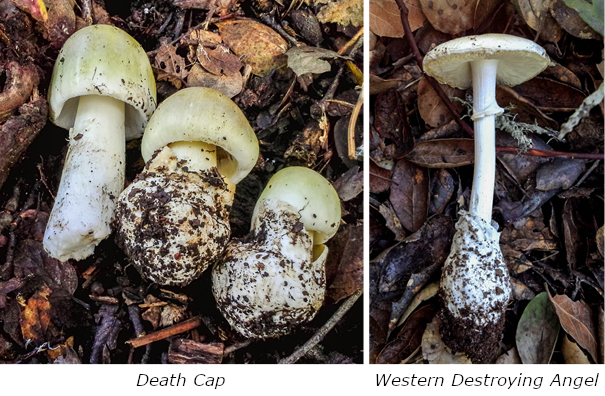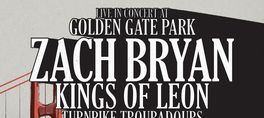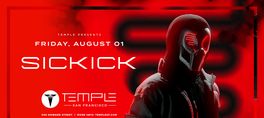Celebrate the fruits of winter! View hundreds of local mushroom specimens, mingle with the mycological community, and enjoy presentations by guest speakers at this two day special event. All ages welcome!
Additionally - Annual Wild Mushroom Warning
Each year, mushrooms come out after the first rains of the season. Mushrooms are ecologically important and can look beautiful - but some of them contain dangerous toxins. The death cap (Amanita phalloides) and Western destroying angel (Amanita ocreata) are two of the world's most toxic mushrooms, and both can be found in East Bay Regional Parks during the rainy season.
The death cap and Western destroying angel mushrooms contain amatoxins, a group of molecules that inhibit cellular metabolism in many animals. In mammals, the liver and kidneys are typically the first organs affected after ingestion. Symptoms don't usually appear until up to 12 hours after consumption, beginning as severe gastrointestinal distress and progressing to the liver and renal failure if treatment is not sought immediately.
"Both of these toxic mushrooms can be lethal to humans and pets if consumed," said East Bay Regional Park District Naturalist Trent Pearce, who is based in Tilden Regional Park and documents the fungi in East Bay Regional Parks. "They are mostly associated with oak trees and can be found growing anywhere oak roots are present."
The death cap is a medium-to-large mushroom that typically has a greenish-gray cap, white gills, a white ring around the stem, and a large white sac at the base of the stem. Though the death cap is mainly associated with oak trees, it has been found growing with other hardwoods. It was accidentally introduced to North America on the roots of European cork oaks and is now slowly colonizing the West Coast. The death cap is not native to California.
The Western destroying angel is a medium-to-large mushroom that usually has a creamy white cap, white gills, a white ring around the stem that disappears with age, and a thin white sac at the base. It fruits from late winter into spring. It is associated exclusively with oaks. Unlike the death cap, it is a native California mushroom.
"The Park District urges the public to be safe and knowledgeable about toxic mushrooms when encountering them in the parks," said East Bay Regional Park District Public Information Supervisor Dave Mason. "Collecting mushrooms in East Bay Regional Parks is not allowed."
The death cap and Western destroying angel can also be dangerous for pets.
"Dog owners should keep a close watch on their dogs during the winter months," said Mason. "Pet owners should contact a veterinarian immediately if they suspect their pet may have eaten a toxic mushroom."
While the death cap and western destroying angel mushrooms are responsible for most cases of mushroom poisonings in California, deadly toxins can also be found in Galerina and Lepiota mushroom species, both of which are found in the Bay Area.
show less
Additionally - Annual Wild Mushroom Warning
Each year, mushrooms come out after the first rains of the season. Mushrooms are ecologically important and can look beautiful - but some of them contain dangerous toxins. The death cap (Amanita phalloides) and Western destroying angel (Amanita ocreata) are two of the world's most toxic mushrooms, and both can be found in East Bay Regional Parks during the rainy season.
The death cap and Western destroying angel mushrooms contain amatoxins, a group of molecules that inhibit cellular metabolism in many animals. In mammals, the liver and kidneys are typically the first organs affected after ingestion. Symptoms don't usually appear until up to 12 hours after consumption, beginning as severe gastrointestinal distress and progressing to the liver and renal failure if treatment is not sought immediately.
"Both of these toxic mushrooms can be lethal to humans and pets if consumed," said East Bay Regional Park District Naturalist Trent Pearce, who is based in Tilden Regional Park and documents the fungi in East Bay Regional Parks. "They are mostly associated with oak trees and can be found growing anywhere oak roots are present."
The death cap is a medium-to-large mushroom that typically has a greenish-gray cap, white gills, a white ring around the stem, and a large white sac at the base of the stem. Though the death cap is mainly associated with oak trees, it has been found growing with other hardwoods. It was accidentally introduced to North America on the roots of European cork oaks and is now slowly colonizing the West Coast. The death cap is not native to California.
The Western destroying angel is a medium-to-large mushroom that usually has a creamy white cap, white gills, a white ring around the stem that disappears with age, and a thin white sac at the base. It fruits from late winter into spring. It is associated exclusively with oaks. Unlike the death cap, it is a native California mushroom.
"The Park District urges the public to be safe and knowledgeable about toxic mushrooms when encountering them in the parks," said East Bay Regional Park District Public Information Supervisor Dave Mason. "Collecting mushrooms in East Bay Regional Parks is not allowed."
The death cap and Western destroying angel can also be dangerous for pets.
"Dog owners should keep a close watch on their dogs during the winter months," said Mason. "Pet owners should contact a veterinarian immediately if they suspect their pet may have eaten a toxic mushroom."
While the death cap and western destroying angel mushrooms are responsible for most cases of mushroom poisonings in California, deadly toxins can also be found in Galerina and Lepiota mushroom species, both of which are found in the Bay Area.
Celebrate the fruits of winter! View hundreds of local mushroom specimens, mingle with the mycological community, and enjoy presentations by guest speakers at this two day special event. All ages welcome!
Additionally - Annual Wild Mushroom Warning
Each year, mushrooms come out after the first rains of the season. Mushrooms are ecologically important and can look beautiful - but some of them contain dangerous toxins. The death cap (Amanita phalloides) and Western destroying angel (Amanita ocreata) are two of the world's most toxic mushrooms, and both can be found in East Bay Regional Parks during the rainy season.
The death cap and Western destroying angel mushrooms contain amatoxins, a group of molecules that inhibit cellular metabolism in many animals. In mammals, the liver and kidneys are typically the first organs affected after ingestion. Symptoms don't usually appear until up to 12 hours after consumption, beginning as severe gastrointestinal distress and progressing to the liver and renal failure if treatment is not sought immediately.
"Both of these toxic mushrooms can be lethal to humans and pets if consumed," said East Bay Regional Park District Naturalist Trent Pearce, who is based in Tilden Regional Park and documents the fungi in East Bay Regional Parks. "They are mostly associated with oak trees and can be found growing anywhere oak roots are present."
The death cap is a medium-to-large mushroom that typically has a greenish-gray cap, white gills, a white ring around the stem, and a large white sac at the base of the stem. Though the death cap is mainly associated with oak trees, it has been found growing with other hardwoods. It was accidentally introduced to North America on the roots of European cork oaks and is now slowly colonizing the West Coast. The death cap is not native to California.
The Western destroying angel is a medium-to-large mushroom that usually has a creamy white cap, white gills, a white ring around the stem that disappears with age, and a thin white sac at the base. It fruits from late winter into spring. It is associated exclusively with oaks. Unlike the death cap, it is a native California mushroom.
"The Park District urges the public to be safe and knowledgeable about toxic mushrooms when encountering them in the parks," said East Bay Regional Park District Public Information Supervisor Dave Mason. "Collecting mushrooms in East Bay Regional Parks is not allowed."
The death cap and Western destroying angel can also be dangerous for pets.
"Dog owners should keep a close watch on their dogs during the winter months," said Mason. "Pet owners should contact a veterinarian immediately if they suspect their pet may have eaten a toxic mushroom."
While the death cap and western destroying angel mushrooms are responsible for most cases of mushroom poisonings in California, deadly toxins can also be found in Galerina and Lepiota mushroom species, both of which are found in the Bay Area.
read more
Additionally - Annual Wild Mushroom Warning
Each year, mushrooms come out after the first rains of the season. Mushrooms are ecologically important and can look beautiful - but some of them contain dangerous toxins. The death cap (Amanita phalloides) and Western destroying angel (Amanita ocreata) are two of the world's most toxic mushrooms, and both can be found in East Bay Regional Parks during the rainy season.
The death cap and Western destroying angel mushrooms contain amatoxins, a group of molecules that inhibit cellular metabolism in many animals. In mammals, the liver and kidneys are typically the first organs affected after ingestion. Symptoms don't usually appear until up to 12 hours after consumption, beginning as severe gastrointestinal distress and progressing to the liver and renal failure if treatment is not sought immediately.
"Both of these toxic mushrooms can be lethal to humans and pets if consumed," said East Bay Regional Park District Naturalist Trent Pearce, who is based in Tilden Regional Park and documents the fungi in East Bay Regional Parks. "They are mostly associated with oak trees and can be found growing anywhere oak roots are present."
The death cap is a medium-to-large mushroom that typically has a greenish-gray cap, white gills, a white ring around the stem, and a large white sac at the base of the stem. Though the death cap is mainly associated with oak trees, it has been found growing with other hardwoods. It was accidentally introduced to North America on the roots of European cork oaks and is now slowly colonizing the West Coast. The death cap is not native to California.
The Western destroying angel is a medium-to-large mushroom that usually has a creamy white cap, white gills, a white ring around the stem that disappears with age, and a thin white sac at the base. It fruits from late winter into spring. It is associated exclusively with oaks. Unlike the death cap, it is a native California mushroom.
"The Park District urges the public to be safe and knowledgeable about toxic mushrooms when encountering them in the parks," said East Bay Regional Park District Public Information Supervisor Dave Mason. "Collecting mushrooms in East Bay Regional Parks is not allowed."
The death cap and Western destroying angel can also be dangerous for pets.
"Dog owners should keep a close watch on their dogs during the winter months," said Mason. "Pet owners should contact a veterinarian immediately if they suspect their pet may have eaten a toxic mushroom."
While the death cap and western destroying angel mushrooms are responsible for most cases of mushroom poisonings in California, deadly toxins can also be found in Galerina and Lepiota mushroom species, both of which are found in the Bay Area.
show less
Date/Times:
Tilden Park, Berkeley, CA 94702
The Best Events
Every Week in Your Inbox
From Our Sponsors
UPCOMING EVENTS
Great suggestion! We'll be in touch.
Event reviewed successfully.









